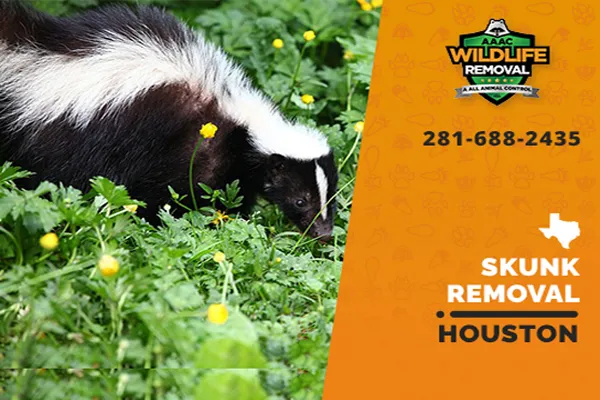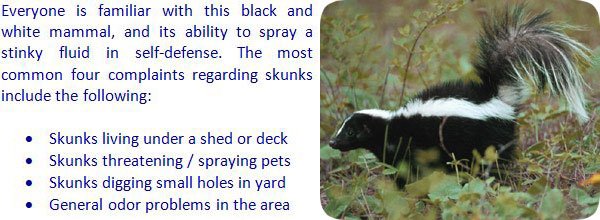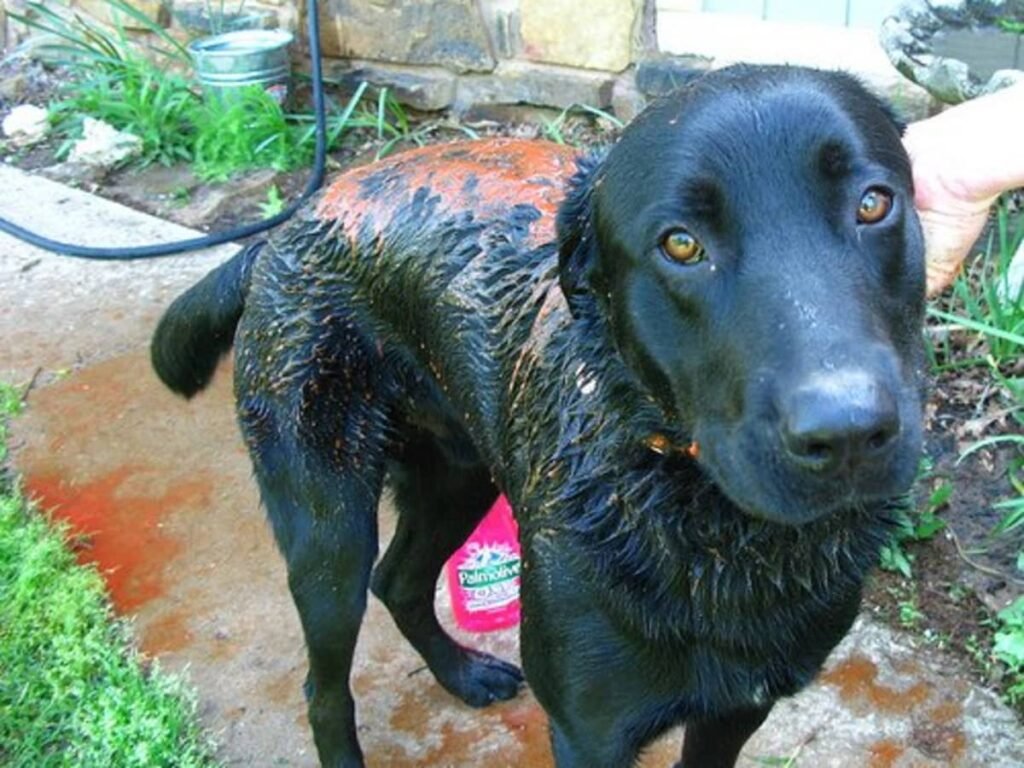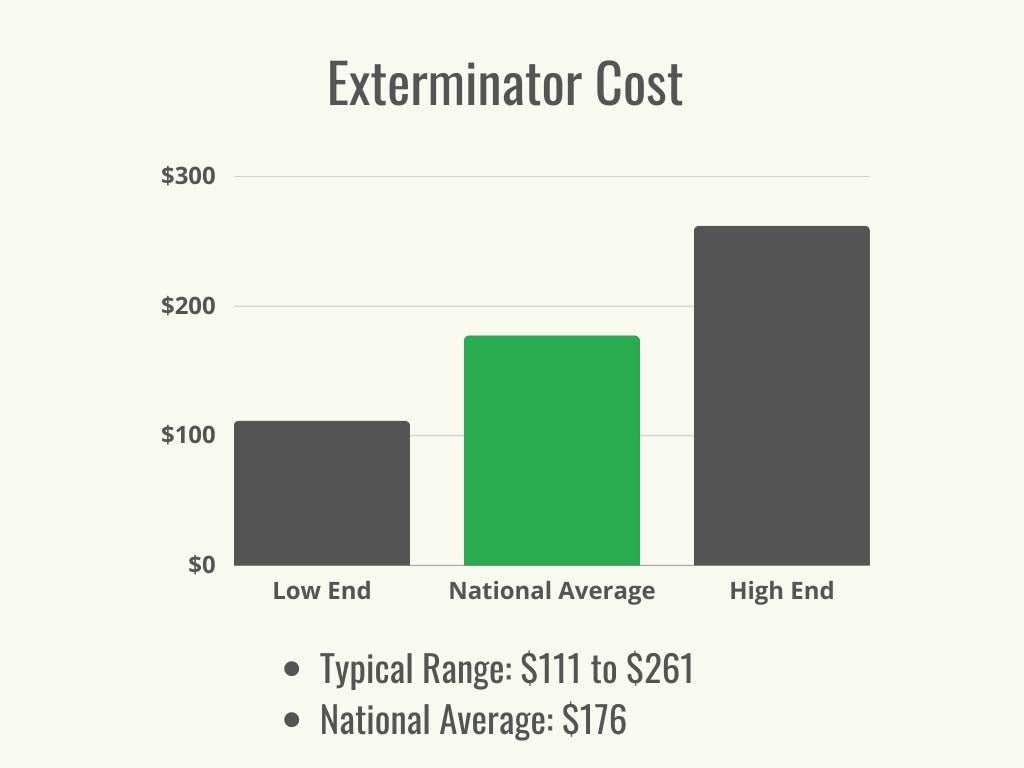If you’re dealing with a skunk problem in your neighborhood, you might be wondering if animal control is the solution. Skunks can be a nuisance and their distinctive smell can become unbearable. In this article, we will explore whether or not animal control will handle skunk removal. We’ll discuss what steps you can take and what to expect when dealing with these pesky critters. So, if you’re looking for answers and want to say goodbye to skunks, keep reading!


What is Animal Control?
Definition
Animal control refers to the government or municipal agency responsible for managing and regulating animals within a community. Their primary goal is to ensure the welfare and safety of both humans and animals. Animal control officers are trained professionals who handle various tasks related to animals, including enforcement of animal-related laws, responding to calls regarding stray or aggressive animals, and providing assistance with issues such as wildlife intrusion, including skunk infestations.
Responsibilities
Animal control agencies have a wide range of responsibilities, all aimed at maintaining a harmonious balance between humans and animals. Some of their key roles include:
- Responding to public calls and complaints related to animal-related issues, such as loose or dangerous animals.
- Ensuring public safety by capturing and containing stray or aggressive animals.
- Enforcing local animal control laws and regulations, such as leash laws or restrictions on exotic pets.
- Educating the public on responsible pet ownership, including spaying/neutering, vaccinations, and proper care.
- Managing and promoting animal welfare, including handling cases of animal cruelty and neglect.
- Providing assistance with wildlife intrusion and offering guidance on how to safely deal with wild animals, such as skunks.
Skunks as a Nuisance
Reasons for Skunk Nuisance
Skunks can become a nuisance to humans for several reasons. Primarily, skunks are attracted to residential areas due to the abundance of food sources, such as garbage, pet food, or even gardens. They are known to dig up lawns in search of grubs and insects as well. Additionally, skunks sometimes seek shelter in or under buildings, leading to potential property damage. Their distinctive odor, emitted as a defense mechanism, is another reason why people find skunk encounters unpleasant.
Common Problems Caused by Skunks
Skunks can cause various problems when they invade residential areas:
- Property damage: Skunks are excellent diggers and can cause significant damage to lawns, gardens, and even the foundation of buildings when they burrow underneath. This can result in costly repairs.
- Unpleasant odor: When skunks feel threatened, they release a strong-smelling spray as a defense mechanism. The smell can linger for days and is difficult to eliminate, making encounters with skunks unpleasant for humans and pets alike.
- Disease transmission: Skunks can carry diseases such as rabies, which poses a risk to humans and domestic animals. Contact with skunk saliva or bites can result in potential transmission of these diseases.
- Aggression and pet conflicts: Skunks are generally non-aggressive animals, but they may become defensive if they feel threatened. This can lead to conflicts with pets, resulting in injuries and potential medical expenses.
Animal Control and Skunk Removal
Overview of Animal Control’s Role
Animal control plays a crucial role in assisting with skunk removal. When contacted by residents, animal control officers assess the situation, provide guidance, and, if necessary, take appropriate action to safely remove the skunks. Their experience and knowledge of wildlife behavior and local regulations make them a valuable resource in dealing with skunk-related issues.
Methods Used for Skunk Removal
Animal control officers employ various methods for skunk removal, depending on the specific circumstances. Some commonly used methods include:
- Trapping: Animal control may set up traps specifically designed for capturing skunks without causing harm. Once captured, the skunks are safely relocated to a more appropriate habitat away from human dwellings.
- Exclusion techniques: Animal control may employ strategies to prevent skunks from accessing certain areas, such as sealing entry points or installing barriers. This helps minimize the chances of skunks returning to the same location.
- Humane deterrents: Animal control may recommend the use of humane deterrents, such as motion-activated sprinklers or bright lights, to discourage skunks from frequenting residential areas.
Determining Skunk Removal Assistance
Level of Infestation
When considering whether to seek animal control assistance for skunk removal, it is essential to assess the level of infestation. If you only spot a skunk occasionally and it does not cause significant problems, you may attempt to address the situation yourself. However, if the skunk population increases, poses a risk to your safety, or causes substantial property damage, it is advisable to seek professional help from animal control.
Local Animal Control Policies
Different animal control agencies may have varying policies regarding skunk removal. Therefore, it is crucial to familiarize yourself with the specific regulations and procedures in your area. Some cities or states require residents to contact animal control for any wildlife-related issues, while others allow limited intervention by residents. Knowing the local policies will help you determine the appropriate course of action.


Contacting Animal Control
Emergency Situations
If you encounter a skunk that poses an immediate threat to your safety or the safety of others, it is considered an emergency situation. In such cases, it is crucial to contact your local animal control agency or emergency services immediately. Animal control officers are trained to handle such situations and can respond promptly to ensure everyone’s safety.
Non-Emergency Situations
For non-emergency situations involving skunks, it is still recommended to contact animal control for guidance and assistance. Even if the situation seems manageable, animal control officers can provide valuable advice on mitigating skunk-related issues and taking necessary precautions. They can also determine if the situation warrants their direct intervention or if you can address it on your own.
Animal Control Response and Evaluation
Assessment of the Situation
When animal control receives a call regarding a skunk sighting or infestation, they will first assess the situation. This assessment involves gathering information about the location, number of skunks involved, any existing damage, and potential risks to humans or pets. Based on this evaluation, animal control officers will determine the appropriate response.
Determining the Necessity of Skunk Removal
Not all skunk encounters necessarily require removal. Animal control officers consider several factors before deciding on the best course of action. These factors include the level of infestation, the extent of property damage, potential health risks, and the overall impact on the community. In some cases, animal control may opt for less invasive measures, such as educating residents on skunk deterrent techniques, rather than immediate removal.


Alternatives to Animal Control
Hiring a Professional Wildlife Removal Service
In situations where animal control is unable to respond promptly or if you prefer specialized assistance, hiring a professional wildlife removal service can be an alternative. These services specialize in humanely removing and relocating skunks and other wildlife. Ensure that any service you consider is licensed and follows ethical practices to ensure the well-being of both animals and the environment.
DIY Skunk Trapping and Relocation
For those who are comfortable handling wildlife and have the necessary knowledge, trapping and relocating skunks themselves may be an option. However, it is crucial to research and follow local regulations regarding trapping, as well as taking safety precautions to minimize the risk of injury or disease transmission. DIY skunk removal should only be attempted by individuals with appropriate experience and understanding of wildlife behavior.
Animal Control Laws and Regulations
Legal Restrictions on Skunk Removal
Skunk removal is subject to specific laws and regulations to ensure the ethical and humane treatment of animals. These laws vary by jurisdiction, so it is essential to familiarize yourself with the applicable regulations in your area. Some jurisdictions require permits or licenses to remove skunks, while others may restrict removal only to licensed professionals. Compliance with these regulations is essential to avoid legal consequences and to protect the well-being of skunks.
Permits and Licenses
When skunk removal requires permits or licenses, it is typically to ensure that only trained and authorized individuals handle the capture and relocation of skunks. Animal control may hold the necessary permits, or they can guide you on the process of obtaining one if needed. It is essential to follow the proper procedures to ensure the compliant and ethical removal of skunks.


Animal Control’s Approach to Skunk Removal
Humane Methods
Animal control agencies prioritize the use of humane methods when dealing with skunks. This means ensuring that skunks are captured and relocated without causing unnecessary harm or distress. Animal control officers are trained to handle skunks safely and minimize any potential risks to both the animals and the community.
Considerations for Skunk Babies
During certain times of the year, skunks may have babies or be caring for them. Animal control takes this into consideration when determining the appropriate course of action. In such cases, their approach may involve separating the babies from the mother and relocating them together, or waiting until the babies are old enough to fend for themselves. Animal control officers have the expertise to evaluate the situation and choose the most humane and effective approach for both the skunks and humans involved.
Educational Resources and Tips
Preventing Skunk Encounters
Prevention is key when it comes to skunk encounters. Some tips to minimize the likelihood of skunks being attracted to your property include:
- Secure garbage cans with tight-fitting lids to prevent skunks from accessing food sources.
- Remove potential shelter spaces, such as woodpiles or debris, where skunks may burrow.
- Install barriers or fencing around gardens or areas vulnerable to skunk intrusion.
- Keep pet food indoors, especially at night, as skunks are attracted to pet food’s strong odor.
Dealing with Skunk Spray
In the unfortunate event of a skunk spraying incident, prompt action can help mitigate the effects. Here are some steps to take:
- Move away from the skunk and avoid any sudden movements that may startle it further.
- Rinse affected areas with a solution of hydrogen peroxide, baking soda, and dish soap to neutralize the odor. Avoid any contact with the eyes or ingestion of the solution.
- Wash clothes and any items that came into contact with the spray using odor-neutralizing detergents or specialized products.
- If the skunk spray gets into your eyes or causes irritation, seek medical attention immediately.
By following these educational resources and tips, you can reduce the chances of skunk encounters and effectively handle any skunk-related issues that may arise.
In conclusion, animal control plays a crucial role in assisting with skunk-related issues. From skunk removal to educating the public on preventive measures, they are equipped to handle various situations. If you find yourself dealing with a skunk nuisance, it is recommended to contact your local animal control agency for guidance and assistance. Remember to follow local regulations, prioritize humane methods, and consider the well-being of both humans and skunks when addressing any skunk-related problems.


Your Expert in Animal Control and Extermination. Trust our experience for humane, effective pest management, protecting your property and ensuring peace of mind with Michael S.





